#dd man at arms
Text
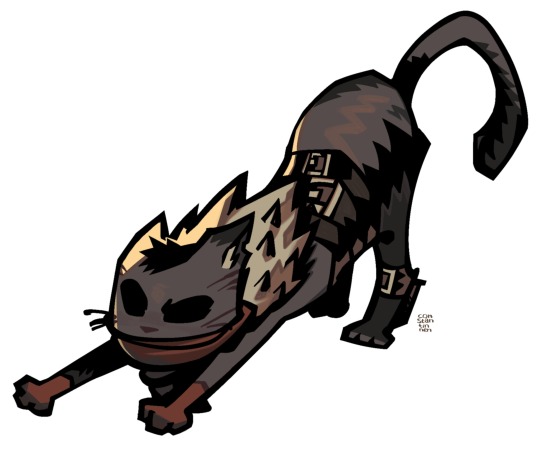


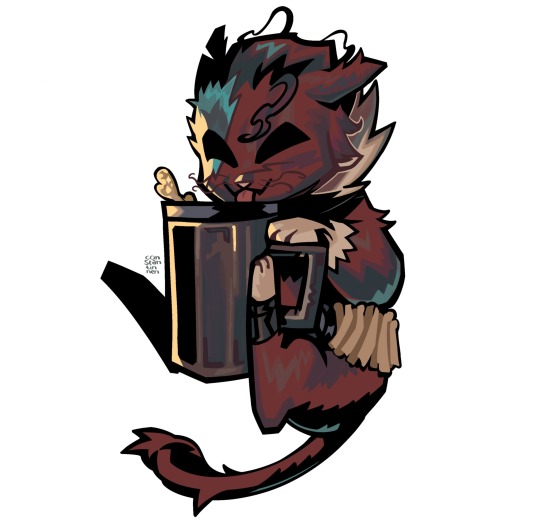
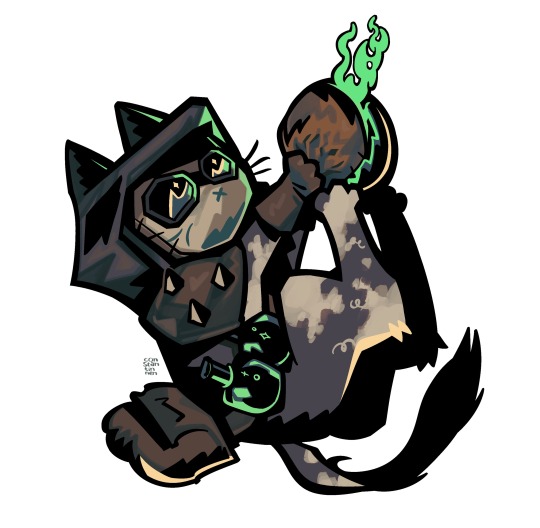
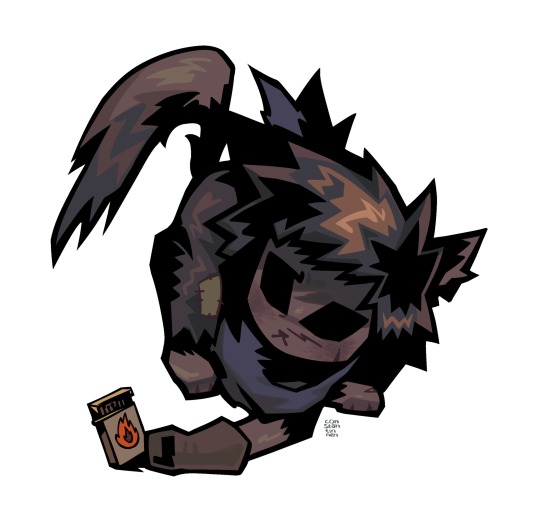
part two kittens.
part one.
#art#fanart#game#darkest dungeon#darkest dungeon 2#darkest dungeon ii#dd grave robber#dd hellion#dd plague doctor#dd man at arms#dd occultist#dd runaway#dd highwayman
912 notes
·
View notes
Text

A nice dip in the soothing waters of the Oasis 😌
#darkest dungeon#dd man at arms#dd grave robber#dd plague doctor#dd highwayman#darkest dungeon 2#dd2#darkest dungeon fanart
177 notes
·
View notes
Text

Toot toot
Wanted to practice some faces and my hand slipped
#fan art#darkest dungeon#darkest dungeon ii#dd plague doctor#dd grave robber#dd man at arms#dd jester#dd highwayman#dd houndmaster#dd antiquarian#dd abomination#dd audrey#dd crusader#dd vestal#dd bounty hunter#dd occultist#dd flagellant#dd leper#dd hellion#dd musketeer
260 notes
·
View notes
Text

To victory! ✨ 🏆 ✨
#my art#darkest dungeon#man at arms#occultist#dd man at arms#dd occultist#darkest dungeon man at arms#darkest dungeon occultist#dd maa#dd barristan#dd alhazred#digital art#artists on tumblr#my darkest dungeon art
81 notes
·
View notes
Text

he lives in my brain rent free
82 notes
·
View notes
Text
Reynauld and Tardif having little to do with each other but always ending up in metaphorical dick-measuring contests. There can be only one burly bitter combat veteran with a face-concealing helmet and questionable morals.
Barristan just conks their heads together and tells them to get back in line.
#dd prompts#headcanons#dd reynauld#dd tardif#dd barristan#dd man at arms#dd bounty hunter#dd crusader#darkest dungeon
66 notes
·
View notes
Photo
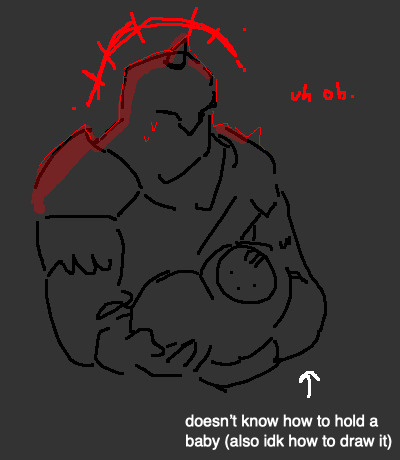




A wacky story in which Tardif tries very hard to avoid fatherhood.
PART TWO HERE because tumblr has an image limit
Art by me, all the dialogue taken (and slightly edited to make sense irl) from this amazing post by @darkestprompts
Better image quality so you can actually read it > https://imgur.com/a/dhNdV2O
#darkest dungeon#dd bounty hunter#dd arbalest#dd houndmaster#highwayman#occultist#hellion#literally drew all of them again i don't wanna keep tagging#dd plague doctor#dd man at arms#crusader#shieldbreaker#grave robber#antiquarian#leper#jester#abomination#back at it again with the mspaint art#the tags don't make sense anymore with the image limit :(
970 notes
·
View notes
Text

(it may look super fuzzy unless you click on the image)
guess who got dd2
29 notes
·
View notes
Text

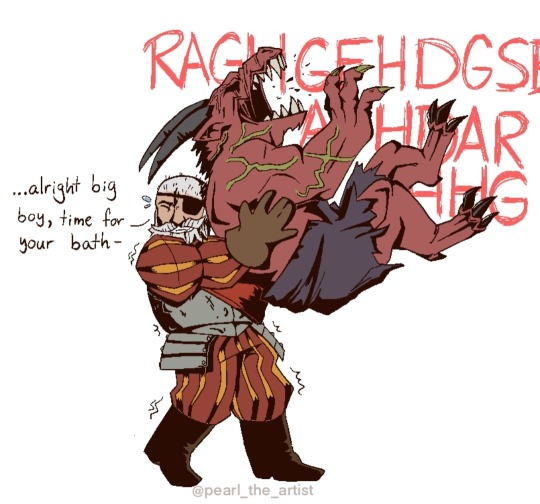
This was a lot funnier in my head.
395 notes
·
View notes
Note
Since we both want to forget about the DD tinfood; what do you think would be some good rations to take into a dungeon? What do heroes like/despise? Eating habits? Bonus points for the heroes' favourite foods, or some signature dishes from their homeland.
Thank you for this ask, and sorry for taking so long to answer! This ask actually allows me to share a lot of things I've looked into for my writing of "Restructured, refractured, recalled" - but it’s mostly background flavour work to add the text its flavour, and usually isn’t too noticeable. Still, I’ve spent quite some time reading and thinking about it. Hyperfixation at its finest, what do you do.
LOADS of ramblings are incoming! Thee hast been warned.
So the thing is, I have to admit that I'm biased in a way - I was researching it all from the perspective of my Heiress, and thus, the decisions made in the food provided (and the housing, technically, but that’s a separate story) are made with her personality in mind, that being cold, calculated and completely, utterly devoid of any understanding of empathy. Therefore, the sustenance was akin to solving a puzzle - how to feed the heroes without it being too costly.
The biggest number of heroes Hamlet could house at any given moment (provided there are fully repaired and upgraded barracks and we count one additional slot provided by Shieldbreaker DLC and no one is out on a mission) is 29. This is huge, considering that Hamlet, if taken in its most literal sense, is a tiny settlement, with a population of fewer than 100 people from what I could gather. Interestingly, “hamlet” is defined as “a small settlement that has no central place of worship and no meeting point, for example, a village hall”, but Hamlet in DD has a whole Abbey. Which I think is supposed to be bigger than mere church...? But frankly, I’m far from being a religious person, so I’m not sure how that is supposed to work or is it yet another “here’s a tin can, don’t think about it if you want your sanity back” thing. We might never know. If someone knows about it, feel free to write to me; I’d love to understand it.
The point of this tangent is that if we assume that Hamlet has a population of 100, adding 29 heroes is impossible for the town to feed on its own. That might explain the need to provide the sustenance for the expeditions out of the Heiress’ pockets at a full price instead of getting it as a tax, for example, from the lands she supposedly owns. And an argument could be made that it’s only a 2:100 ratio when we first come to Hamlet and that the first Vestal is from the Abbey itself, and the first PD is a scholar from a Sanatorium (hence them always being the first additions to your team that you get), and that the population of Hamlet increases with the infrastructure you re-build and the more monsters you clear out the more people come to Hamlet, thus making the food situation more manageable. Another argument can be made that Hamlet is merely a name that historically stuck, and the actual population is much higher than the name would suggest. The fact that even in its most dilapidated state, the town has stone buildings and bridges, and a working harbour, as well as noblemen with titles as high as Countess coming to the Estate in the past somewhat supports this idea. A small settlement wouldn’t be able to feed and support the revelry that Ancestor was supposedly having before your time. Then again, it’s very hard to understand what is a limitation of the game, what is a deliberate artistic choice and what is simply the rule of cool, here.
Now to the food itself.
First of all, there’s foraging during the expeditions themselves. Save for Ruins, there’s always a non-zero chance to find or get food if you know what you’re doing. A bag of herbs can cleanse enough things to sustain a party for at least some time. The real quality of said sustenance is dubious at best, but when the alternative is starvation, one cannot be picky. It’s hard to say for sure what can be found in each location but we can speculate. There’s fish, sea monster meat, whale meat (based on the corpse in one of the rooms) and seaweed in Cove; most likely wild game carcasses and gnashers in Weald (fun fact! rabies virus is extremely susceptible to heat, just 50 degrees Celsius is enough to destroy it, so technically, cooked gnasher meat should be safely edible for heroes); stolen food from surrounding farms and swine carcasses themselves (for completely desensitised heroes) in Warrens - based on the quest for stealing their food, humans and swine require the same or extremely similar sustenance, after all. Also, there are molluscs and barnacles in Cove, rats and mice in Ruins, Weald and Warrens, nuts, berries, acorns and wild greens in the Weald and lichen most likely everywhere, all of which can be used to stretch the rations for longer.
Second of all, Hamlet is sea-side which has a huge benefit we might not appreciate enough nowadays, that being - an abundance of relatively cheap (Hamlet seems to be in middle latitudes (despite there being surface corals, I hate it here, I hate it here so much), so salt extraction cannot be achieved by solar power alone and requires some fuel source; fortunately, Weald is in the convenient distance), available sea salt for any needs. Namely, for food preservation. Yes, one can argue that having fishfolk in the Cove increases the cost, but I'd argue anything in Hamlet is far from being monster-proof, so I assume that the possibility of being butchered by some eldritch horrors during work hours is simply included in the baseline cost.
Regardless, having access to the sea/ocean and a huge forest, as well as farms (we know they canonically exist because of the Bumper Crop event and well, Farmstead) makes salted meat and fish quite readily available for heroes during their expeditions. Moreover, salted meat, fish and lard can be used in cooking during camping and eliminates the need of salting the pottage it is added to, serving a double purpose.
Now, on the topic of something more affordable - such as bread. Bread in itself isn't as storage-efficient as it may look at a first glance - even if we're talking about denser, heavier "peasant" (that is, rye, oats or barley instead of more expensive wheat) wholewheat bread. However, considering there's a town which can be tasked with it, ordering the baking of hardtack and flatbreads specifically for the purpose of providing for the expeditions looks like a reasonable choice. They are cheaper (requiring no yeast, beer barm or beer), and need only water, flour and salt, all of which Hamlet has access to. And, well, this is one of the most sufficient, calorie-dense and cheap options - ideal for our heartless, calculating Heiress. Far more affordable than meat, for example. Furthermore, it can be used to thicken and enrich some sort of stew or pottage, and we can see some sort of (presumably?) stew, pottage or soup being cooked during the camping in the pot that heroes canonically carry with them. Providing hardtack instead of grains can even be considered being "merciful" or "caring" since cooking them in some sort of gruel is far easier, and the resulting dish is far more nourishing than having to deal with plain grains on the expeditions (by either making porridge/gruel out of them or having to make some sort of flatbread by themselves).
Also, an abundance of salt means we probably have pickled/brined vegetables as a part of the rations. Pickles are sturdy, easy to transport, don’t require refrigeration and again, have the added bonus of salting otherwise unsalted stew. What types of vegetables those might be is tricky to suggest, but it is known that onions, carrots, peas, beans, rutabaga and cabbage were used a lot during medieval times. Parsnips were used up until the 16th century, from what I can find, and considering other anachronisms, they are a safe bet to add. Dried beans and peas are easy to transport and can be used as a base for stews and pottages, especially combined with other ingredients. The inclusion of fresh vegetables is more up to debate since they require more prep work. But onions, carrots and other roots are quite easy to transport and deal with, even during the expedition, and should last the canonical week well enough while adding quite a lot of nutrition to the supposed pottage. Especially if we consider that cabbage, peas and carrots were the cheapest available options for nourishment - again, ideal for our Heiress, who is only interested in keeping her hired muscles fed, not fed well.
Then there are eggs. They have an added bonus of not requiring to kill the hen, and therefore are relatively cheap. Cheaper than chicken meat, that’s for sure (and yes, I am aware, that cockerels were mostly raised for meat, killing a hen was more flaunting wealth than anything else in medieval times). Raw eggs are rather fragile, however, fresh eggs can last a week or two without refrigeration making them a nice addition to the meal, if it was possible to carry them - because honestly, adding just a couple of eggs to the gruel adds a lot to its nutritional value. On the contrary, hard-boiled eggs only last a couple of hours before starting to spoil but are far easier to transport, possibly playing the role of some sort of "on the road" snack, for a lack of a better term. However, they are far better used as an ingredient for our next option.
And the option is pastry! There is evidence of pies being abundant in the medieval period and them being used as meals during the working day. Pies had a wide variety of fillings, from extremely expensive beef or veal and venison to much more affordable pork, to fish, to fruit. Pies are not considered long-lasting provisions, but they could’ve been used as a “food for the first day” sort of rations, while longer-lasting products or raw products that required cooking were kept for the last days of the expedition. Again, there were types of very bland pastry, basically water with flour and a bit of salt, which was merely a holder for the filling, and I think it would fit the type of food the Heiress could provide for her mercenaries. More costly fillings (such as meat or cheese) can be diluted with vegetables while providing more volume, thus lowering the cost even further. I’m not entirely sure what can be the thing that heroes fry during their camping. It can be some sort of root vegetable, chopped and cooked. Or can be some sort of pastry or dumplings that have probably gone stale during the expedition and are re-heated in molten lard to make them edible again. Honourable mention goes to halusky, a variety of dumplings cooked in the Central and Eastern European cuisines. These are small lumps cut from a thick flour and egg batter and dropped into boiling water. The lack of filling makes them – say it with me – cheaper and thus, more valuable as food to give to the mercenaries, however (and I can say it from experience) they are extremely filling, especially if combined with lard.
Also, one cannot forget about cheese as a product with high nutritional value, good shelf life and the added benefit of easy transportation. Cheese as a type of food was commonplace in medieval times, as were whey cheeses (cheeses made from by-products of the production of harder cheeses) due to having no other ways to increase dairy shelf life. Again, because there’s no need to kill the cow to get the cheese, the product was way cheaper than meat. It is dense, has a good nutrition-to-volume ratio, and can be used in stews or eaten by itself, making it very versatile.
Another way of sustenance that was mentioned before is lard and butter. Although butter production in large quantities is way more cattle-heavy, and thus less probable in Hamlet which is canonically situated in dense woods on the seaside. On the other hand, lard is way more available, especially if we consider that pork was the staple meat of medieval times, much like poultry is now. Lard can be salted and/or smoked, and preserves extremely well after it, while serving as a meal when combined with bread. Also, hot lard can be used for meat preservation and cooking, but since it’s liquid, I doubt any of it was used during expeditions. Lard itself, however, in its solid form, is far more viable, as a very calory-dense product, an oil source for frying (since we see some sort of a frying pan during camping) and as a reliable, relatively cheap ingredient.
Another way of adding sustenance was using mushrooms. There’s a history of mushroom consumption, and we even have some medieval recipes requiring mushrooms. Wild mushrooms can add nutrition to pottage or be fried with onions and leaks on lard as a separate dish. They also can be dried to last for a while. The problem is the bigger bipedal mushrooms of the Weald that wouldn’t mind reversing the roles and eating the mushroom hunters and the fact that they possess danger in themselves. While it would be bad enough to have food poisoning, having food poisoning in the middle of an expedition surrounded by eldritch horrors sounds like a very high-risk play. I have no doubt that mushrooms were given to Seekers (level 0 heroes) instead of meat when they were in-season as relatively cheap sustenance, but adding avoidable risk factors for high-level expeditions sounds like a bad investment. After all, high-level heroes are money sinks with their skills, gear and weapons. Therefore, they most likely got other foodstuffs instead of mushrooms.
One more good food that could’ve been used and is relatively cheap is dried fruits. Nothing fancy, though, something simple and readily available in middle latitudes such as dried apples, pears or plums. There’s a source called “Naturalis historia” which, while describing real-world Italy (which is undoubtedly far more southern than Hamlet’s position, not gonna lie), mentions twelve kinds of plums, thirty kinds of apple, forty-one kinds of pear, sorb, cherries and multiple nuts including chestnuts which would’ve probably been available in one capacity or another. Dried berries could also be added as long-lasting, easy-to-transport addition to rations. Namely, dried berries, including rosehip berries, were often used to simply eat or brew drinks.
If the topic of sweeter foodstuffs is touched, one cannot forget about honey. Sugar wasn’t readily available due to sugarcane not being grown in Europe until the mid-15th century and therefore was stupidly expensive. Moreover, sugar was considered valuable mostly for its “medical properties”. Honey, while also isn’t particularly cheap, was far more available for the population. It can last for years without the need for preservation or refrigeration, making it an enticing option for more valuable mercenaries.
On the topic of pottages, stews, drinks and basic sustenance, we cannot forget one crucial component without which no long-term expedition can be carried out – fresh water. In cooking, for drinking, water is required in expeditions, especially when there’s basically zero chance of finding it, like in the Cove or the Ruins. Therefore, the heroes would also have to carry waterskins with water. Said water would most likely be diluted with either wine or vinegar to prevent it from going bad. It is unclear whether Hamlet uses wells or the bridges we see are over actual rivers, but medieval settlements were seldom created without direct access to some source of fresh water.
Finally, there’s the question of flavouring. And while true, spices were extremely costly in the medieval period, costing a ludicrous amount of money, there were quite a few options to spice things up that could’ve been used – especially for preparing the food for longer-lasting, higher-value mercenaries (levels 4 and up let’s say) which Heiress would be interested to keep around at least as a money investment she had committed to. Such spice options include garlic, leeks, onion, rosemary, mint, thyme, horseradish, basil, oregano, sage, parsley, dill, lovage, marjoram and cilantro to name a few. Maybe ginger and some types of pepper (long pepper I believe) that were native to the east.
Thus, the average rations that could’ve been provided could include:
hardtack or flatbreads;
some sort of treated meat (most likely salted due to availability of salt, but cured and smoked, or processed into sausages are also an option);
lard;
cheap dried fruits (like apple, pear or plum);
cheese or whey cheese;
root vegetables (maybe pickled);
dried peas or beans;
drinking water in a waterskin;
additives (salt, flavouring, honey) if provided and/or available.
Again, we know that the meat is provided based on Reynauld’s paranoid barks (“Look, it's all pink. Cook it properly”), and we know that the bread is provided from Junia’s paranoid barks (“The Verses say nothing about fuzzy bread... hmmm...”). “Apples and cheese” and “Stale bread” are foods available in DD2 (as much as I hate to mix those two together, especially because of the potato mentioned there...) and the picture for Hunger shows us some bread, waterskin and sausages, so we know they were canonically offered to heroes.
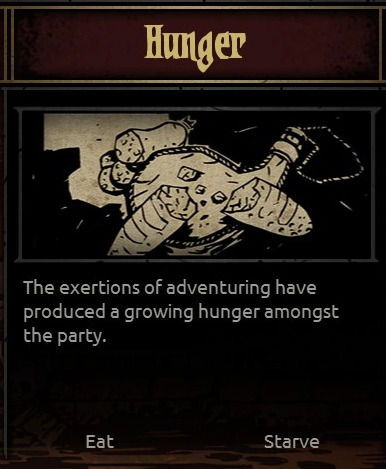
Now, bonus round!
Please note that mostly I have headcanons for characters used in the fic the most (since the abovementioned work was done mostly for writing RRR), and some will be far less thought-through than others.
Abomination/Bigby – he always gives me pause, so again, thank you, @engelsschwert for discussing him with me and offering help. Probably a very polite eater and tries to mimic someone whom he sees as “refined”, such as Alhazred, because he sees himself as eating “like an animal” otherwise. Rather territorial about his food and has food anxiety after being held captive by the cult. Probably loves stews and hearty, hot pottages because they feel “homey”. Doesn’t like fish because fish bones tend to stick in the teeth and make transformations even more unpleasant than they already are.
Antiquarian/Josephine – I can easily picture her loving sweet pastries of more expensive variety and especially those which included almond milk or almond puree. With saffron, if we want to make it extra rich.
Arbalest/Missandei – she is a girl of simple needs, those needs being a mug of good booze and a fine piece of roast fresh from the fire, still dripping fat. Her guilty pleasure is venison and bear meat. Probably used to be a poacher to satisfy them.
Bounty Hunter/Tardif – he loves tooth-rottingly sweet Turkish coffee (or the closest equivalent DD world has to offer). The problem is, despite the fact that Hamlet is a settlement with an operating harbour, I doubt he can enjoy that quite often. The price is simply too high for a mercenary. The idea of dairy makes him sick unless it’s used in baking. One of the few people in Hamlet who knows what carob is and what it tastes like. Prefers any fruits in dry form. Preferably in a pie. Uses kneading dough as an outlet for anger issues – he needs the process, not the result, but just throwing it away is wasteful, so he ended up taking baking as a hobby. Rey is wisely silent about cooking being “unmanly” when Tardif is the one doing it.
Crusader/Reynauld – he’s the only man in Hamlet who knows how to dance around Lent rules without technically breaking them, from arguing that barley geese are grains to guiding pigs into rivers to make them mythical waterhogs or asserting that beavers are fish, Rey knows what he’s doing and isn’t afraid to abuse that knowledge to the fullest when the need arises. Can cook for sustenance but would rather not, since it’s “women’s work”. Has a huge sweet tooth and love for snacks and is in even bigger denial about it because it’s “unmanly”. He spends time blessing every meal even when in a hurry, even for his teammates, and even when they would rather him not do it (eventually most heroes just accepted it as inevitability). Has access to Abbey’s alcohol stocks but doesn’t see much point in inebriation. I have to thank @engelsschwert for his fav food, that being “the poor knights”. Preferably with cream and marmalade with just a pinch of vanilla and cinnamon but he’d rather die of shame than ask for those.
Flagellant/Damian – tried almond milk because of Tardif. Flagellation has not been the same ever since. Actively denies loving it while Tardif nods in agreement and makes another batch of almond cookies. Which mysteriously disappear each and every time. Because of Rey and him, Tardif takes part of his mercenary wages in almond flour. Not that anyone but the Heiress would know. And live.
Grave Robber/Audrey – she would kill for spices. Literally. Ma girl is starved on spices she had as a noble lady. Cinnamon, cloves, nutmeg, peppers, saffron, vanilla – all of those make her mouth water and rational decision-making take a backseat. Probably receives part of her wages in spices. Is extremely picky about her food if she has an option to be. Became friends with Rey because he always knows how to get adequate food during Lent. She loves custard tarts with spices and sugar.
Hellion/Boudica – canonically is fine about eating raw meat and cannibalism but is rather peer-pressured by the Spirits and tribe elders to follow the tradition than sees it as desirable on her own. Has a soft spot for animal and bird-shaped pastry. She sees complicated dishes as a show of weakness but is drawn to them out of curiosity and because they, well, taste good. Her favourite dish is a wild boar roast with cranberries and wild garlic and a slice of black blood bread.
Highwayman/Dismas – is utterly feral about his food and keeping it safe. Whenever he shares food, it’s a big gesture for him. If he actively caters for another person’s food preferences, it’s adoration. Food is basically his love language. Has a taste for meat, and yes, knows well how to cook rats – along with stray dogs, cats and whatnot. Can find food in the most improbable places. Desensitized to the point of being fine with eating cooked swine and fishfolk if it means survival. Loves jerky and needs to have some sort of emergency ration hidden on him to feel sane. Tried coffee once a long time ago and regrets not knowing what it was to look for more of it. His favourite dish is baked pork foreshank which was pre-boiled in dark beer with spices. Not that he can afford this dish often. Or at all.
Houndmaster/Willam – he loves some hearty pork pie, especially of gala variety. Preferably with a pint of nice ale. I wanted to give him some nice shepherd’s pie as his fav dish but it has potatoes which are blasphemy. Dunno why, he gives me strong Irish vibes. I can easily see him enjoying some crubeens and sharing them with Fergus. He’s a bad drinker and cannot hold liquor well but wants to keep up with others (namely Dismas), and usually, it ends badly for him. Has a habit of giving Fergus a bite of his own food and then finishing it, which some find endearing while others view as disgusting.
Jester/Sarmenti – has chronic lead poisoning from sugar of lead he was fed in the Court. Because of that he is irritable and has headaches and abdominal pains. He loves garlic and eats it demonstratively while showing off his Crimson Curse mutations to mess with people. His favourite dish is baked hedgehog with cameline sauce. He hates fruit pies because those were the ones which contained sugar of lead and he has had bad associations ever since. Overindulges in wine and has quite a taste for it thanks to Baldwin.
Leper/Baldwin – not gonna lie, ancient Israelite cuisine isn’t my strong suit. Probably milk- or broth-stewed meat with spices, from what I managed to find…? Veal meat was considered opulent, as was the meat of wild game hunted during the royal hunts. His eating habits most likely changed a lot after his illness, and now he simply prefers softer and lighter foods, which are easier to digest and usually reserved for the sick. Based on being an absolute unit of a man, eats quite a lot. Probably has a strong longing for olives. Has a softer temper and is willing to share but when stress mounts on him, snaps at people because of their table manners and their constant tries to cheat him out of his portion of rations since “he won’t be alive for long anyway”.
Man-at-Arms/Barristan – used to love rather opulent dishes back in his days of glory hounding, something like cherry chicken with rose water. Might enjoy stews and soups more now simply because they remind him of how he was humbled during his campaigns.
Musketeer/Margaret – canonically has a masochistic bark about loving Wraith peppers (a type of chilli peppers native to South America) and makes me cry in tin cans. No further comment.
Occultist/Alhazred – canonically likes or at least drinks coffee based on his masochistic bark. May have shown it to Dismas as a re-discovery. Has an affinity for consuming inadequate quantities of dried fruit, especially southern ones and tiny crumbly biscuits. Dislikes greasy foods because they leave stains on scrolls and books easily and he has a bad habit of absentmindedly eating whatever is in the vicinity while reading, and because of his concentration on the text, he doesn’t really register the taste or what exactly he’s eating. Once, someone placed a wax piece where his biscuits usually are as a joke. Alhazred didn’t notice and doesn’t know to this day why he had that weird constipation one time.
Plague Doctor/Paracelsus – she eats butter. No. You don’t get it. She just eats it as is. Plain butter. In chunks. Preferably from cold storage. Splintered in tiny frozen bits. Sometimes with a sprinkle of flaky unrefined sea salt. It’s her favourite. Says it saves time for more important things. Junia used to cook meals for them both, and Para doesn’t have the heart to throw away the jars and pots she used to bring food in. Now dragging Para to eat so she won’t die from her horrendous diet is mostly Audrey’s and Bigby’s job.
Shieldbreaker/Amani – again, ancient Turkish cuisine isn’t my forte but I can speculate. Because she is a woman in an ancient ottoman world, and an “object”, she probably didn’t get much meat to eat previously. And she might love her dolma, but the allure of breaking a taboo and eating pork is incredibly alluring, so she gets cheap thrills from that. Has a sweet tooth, even though you wouldn’t think that based on her physique and misses more intricate desserts dearly. Is disgusted by what people in Hamlet consider to be “tea” and would rather drink spoiled water. Is forced to eat in a specific manner as it is uncomfortable for her to hold the bowl and eat as most heroes do during camping due to lacking one hand.
Vestal/Junia – loves cheese, especially soft cheese and cream cheese. Especially loves to incorporate them into baking. Making cheesecakes is her passion, she ponders a lot about recipes and she silently respects Tardif for it and is probably the only person who can cook with him even if she is intimidated by him at any other time. Characters in her steamy novels often indulge in cheesecakes too. Is generally saddled with making church bread and cooking during camping much to her chagrin. Knows how to turn a stirring spoon into a weapon. Has a knack of taking grumpy and/or antisocial heroes and making them finally eat.
PHEW! This was a lot. Hope it answers all your questions :}
What’s my final score? ^^
#darkest dungeon#the bloodied journal page || my writing#fan theory#monster-sized txt post#headcanon#i swear i've spent last three days just editing it#dd abomination#dd antiquarian#dd arbalest#dd bounty hunter#dd crusader#dd flagellant#dd grave robber#dd hellion#dd highwayman#dd houndmaster#dd jester#dd leper#dd man at arms#dd musketeer#dd occultist#dd plague doctor#dd shieldbreaker#dd vestal#darkest dungeon worldbuilding#Leave nothing unchecked || references
135 notes
·
View notes
Text

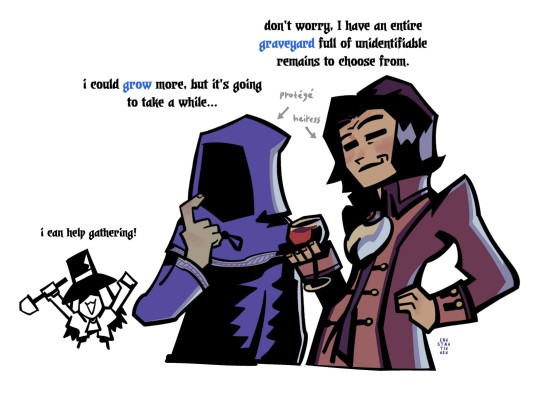
they're going to make a monster of heir-tege-stein from all the remains from reynaulds and dismases that died in a tutorial level.
#art#fanart#game#darkest dungeon#darkest dungeon ii#darkest dungeon 2#dd flagellant#dd man at arms#dd shieldbreaker#dd protégé#dd protege#dd heir
166 notes
·
View notes
Text
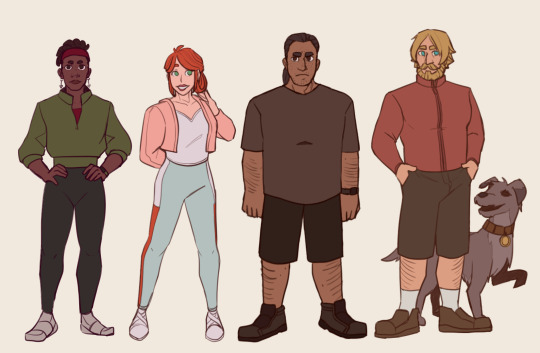
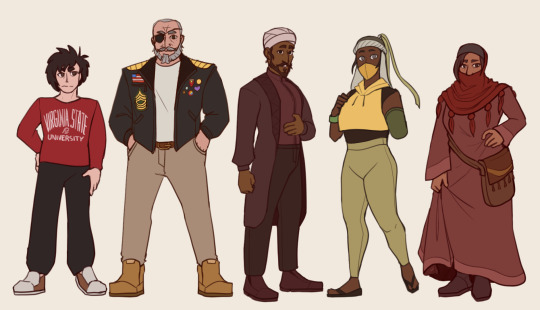

The last nine of my Darkest Dungeon Modern AU cast (Sovereignty)
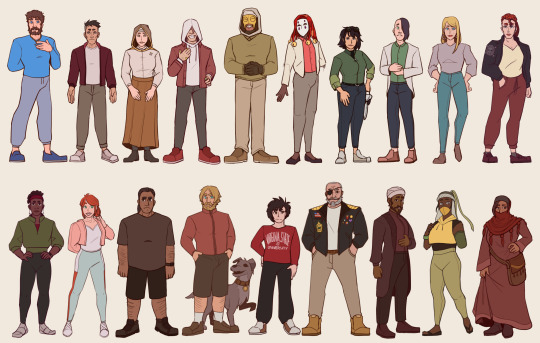

Everyone is here :)
#darkest dungeon#arbalest#musketeer#bounty hunter#houndmaster#runaway#man at arms#occultist#shieldbreaker#antiquarian#dd arbalest#dd musketeer#dd bounty hunter#dd houndmaster#dd runaway#dd man at arms#dd occultist#dd shieldbreaker#dd antiquarian#character design#character lineup#darkest dungeon fanart#darkest dungeon modern au#modern au
202 notes
·
View notes
Text
A Song For the End Times Chapter One: A Darkest Dungeon FF
Chapter One
In which a jester joins a company of mercenaries - a band of heroes are revealed to be going through the motions - and the company's tenuous grip on sanity begins to fray
The hamlet, a solitary island buoyed by a sea of mud. Its buildings irregular and eccentric - bare timbers scavenged from anything that lingered close by for long enough. Signs of damage and recovery frozen in an unending cycle. The wheels of the carriage cut deep welts through the muck. Welts that were soon swollen with stagnant water and then lost. The land itself resisted human markings. Any monument that lingered signalled defiance and arrogance in equal measure.
The carriage ground to a halt. It's driver hauling hard on the reigns, tongue between his teeth, eyes dancing with an old if familiar delight. The horses screamed, hooves rearing and then gouging the sodden earth. At last - once the violence of its arrested momentum had abated - the carriage came to a rest outside the single inn. It lacked a sign or a name, needing neither. Either you knew it existed, in which case it was an essential if singular place of rest and recovery, or you did not. Dim light through the greasy windows. A single remaining shutter drifted on a solitary hinge, threatening to spill into the mud below. Its fellows had long since been taken and repurposed. Lumber was lumber, after all.
A door in the carriage's side banged open, and a single boot with a curled toe emerged. It's bright motley red, a singular slash of colour in that drab place. It was followed by a pair of striped leggings and a dark jerkin. But it was the face that arrested the eye. Mainly that it was hidden behind a white porcelain mask. It turned skyward to face the rain, a pair of green eyes dimly visible in the dark, crinkled eyeholes. Those eyes blinked as the fat drops struck the mask and ran in rivulets. Though their expression was obscured, we must assume they were smiling.
After all, what else are jesters for?
The jester's tread was light across the mud, barely leaving an imprint. Neither they nor the Hamlet's filth seemed to want much to do with the other. As soon as they disembarked, the driver’s whip snapped, the horses screamed once more and the carriage wheeled about and began its gradual disappearance along the solitary, ruined road back to the world. The jester did not turn around and pushed open the inn's door.
Light and heat and body odor struck them in a physical wall. Incense and cloves to disguise the stink of sweat and subtle undertones of rot and mildew. Bare wooden boards underfoot strewn with sodden reeds and stale herbs, in a half-hearted gesture at hygiene. A rude chandelier set in the rafters between him and the bar, its candles guttering and spitting. Benches along the walls and the occasional table with low stools. All of them full. The jester's eyes alighted on each person in turn, although struggled to find any cohesion to them.
Words like motley and rabble seemed insignificant to the disharmonious mix of people in that room. Doctors and clerics sharing tables with life-bitten mercenaries with big hands and unresting eyes. Knights and old soldiers picking over the desiccated carcass of some animal the host had attempted to roast. Occultists and poachers, slobbering maniacs and feather hatted musketeers. A collision of fanatics, mercenaries, the desperate, the dying, and those that dreamed of oblivion.
The jester had never felt more at home.
The wavering light caught their worn weapons and armour. Old and often used, never given the opportunity to rust, and the jester was certain every man and woman knew their business well. Conversation was scant, muted, their minds elsewhere. An air of waiting. Of prized fighters gasping for air between bouts, knowing the next round is imminent and desperate to claim every scant moment of rest. A few pairs of eyes tracked the jester's progress across the floor, but there was little interest. They had seen many pass this way. There will be many more in the days to come.
The innkeeper was a large broad man who wore his vest without a shirt. Greying back hair curling up past his shoulders. To give him his credit, while he embodied the perfect ideal of a grim country innkeeper, he made no attempt to pretend to polish the cups and tankards. His patrons drank often enough that there was no need. Only one other man stood at the bar - a miserable shriveled creature in an oversized frock coat missing several brass buttons. Hair sprouting in irregular tufts. A frozen, crazed and crooked smile. This man trembled where he stood and spoke in fits and bursts of conversation.
'Busy?' this man said, the word sounding more like a convulsion of his stomach.
'Always,' the innkeeper said, watching the jester approach, repeating his lines from an old and tired script, 'Getting busier every day.'
'Terrible,' the shaking man said in another spasm.
The innkeeper nodded, then spoke to the jester.
'Work, drink, or directions?'
The Jester inclined their head in a gentle bow, then spoke.
'Presumably, I need the latter to obtain the former,' their voice was genderless, a depth and tone firmly in the middle. A sense of warmth, the hint of a smile, and the barest suggestion of teeth, 'No offence intended gentle sir, but I doubt neither you nor this gentleman are who I'm looking for.'
The innkeeper pursed his lips, flicked his hand and the gestured to the stairs.
'Up one floor, then right. Second door. The second floor is for something else.
'Alternative entertainment?' the smile in the jester's voice deepened.
'As you say.'
The jester swept a deeper bow, theatrical and unnecessary, before straightening and mounting the stairs. They lingered at the intersection on the upper floors, listening to the little gasps and muffled passion drifting down from the second flight of stairs. The sobs, the pleas, the confessions. They tutted and shook their head.
'My my,' they said.
The upper floors formed a rude ‘L’, with the landing curving around to the right to form little more than a narrow walkway with railings on one side overlooking the bar below, and room doors to the left. Studying the frames, each room had been forcefully entered at least once. Even the railing had been broken and repaired a couple of times.
On the second door hung a sign:
Knock or Die
The jester made a fist, poised, and then considered. Temptation proving top great they gripped the knob and gave it a turn. Then everything went quiet. Absolute silence for a heartbeat, perhaps more. A great feeling of dislocation from the world around them. Everything strange and distant. Then their head cleared and they inspected the smoking hole in the door, an inch to the left of their head, and the fine spray of splinters on the floor.
The sound itself of the gunshot came back to them, then, but as a memory. They'd heard it but some part of their mind had rejected it from all conscious thought. The jester shook their head clear and then knocked.
'Still alive then?' said a voice, male, older, distracted or tired, 'Come in then.'
'Apologies,' the jester said, entering the room and closing the door behind them, 'That sign posed to great a temptation.'
The room was of a modest size, larger than the jester had assumed, and was neat if sparsely furnished. A bed, a wash basin, a table, and a chest. On the table was a worn and stained map and reading the map was a man. Below average size, stocky frame but wirily built, his shirt yellowed with age and repeated wear, and his dark vest fraying around the edges. On the table beside him was a still smoking flintlock pistol, which in turn stopped the map rolling up.
The man didn't look up. One slender finger traced a route, while the other picked at the red scarf around his neck.
'It’s a test,' the man said.
'I see.'
'If you can't follow orders, you'll die. Today, tomorrow, next week. Kinder to get it over with early.'
'Understood.'
'Got a name?' his brows furrowed, and he bent closer to the map. The jester's eyes darted to the shattered longsword mounted on the wall above his bed. Greasy fingerprints where the man had touched the blade. Touched it often.
'Never needed one. Past employers preferred to refer to me by profession.'
The man looked up at them, for the first time. Cold grey eyes. Tired beyond words, beyond sanity. A thin carapace holding it all in. The man took in the jester's clothes, the lute slung on their back, and lowered his gaze again. He snorted and shook his head.
'Of course,' the man said, 'After this week. Why not?'
A silence followed. The man occupied himself with the map. At times it seemed that the man had forgotten him, but the jester guessed this man forgot nothing - and that was part of the trouble.
'Besides the lute, what else have you got? He said, eventually.
'Beside my endless charm and cutting wit? Nothing.'
'Look, I've got former game keepers down there that can cut a reel on a pennywhistle, but they can also gut a man and disappear the body between tea breaks. So unless-'
'Well, there are these,' the jester said producing a sickle and a dirk. The jester never liked to reveal where they hid things or how they produced them, firmly believing their personal value lied in an affected guise of mystique.
The man blinked.
'Sorry, sometimes I forget I have them,' the jester said.
The man nodded. Something seemed to drain out of him then. An air of condemning another to a terrible sentence he knew all too well. His face grew lax, gaze distant and unfixed - drifting downward and away from the jester.
'Dismas,' he said, after a moment. He sighed, 'My name is Dismas. Let's get you situated.'
***
Dismas walked with the stiff alertness of a man used to being ambushed. Shoulders squared, hands at his side – but the jester knew that Dismas would have no trouble reaching the brace of pistols on the bandolier he wore over his vest. Crossing the bar, Dismas exchanged cursory nods and twitches of the lip (which the Jester took for smiles) with some of the mercenaries around the room. When one, a pale young woman in a long coat and a tall wide brimmed hat, moved to rise from her bench to approach, Dismas shook his head. She inclined her head and sat down again without argument.
Dismas pushed open the door and they stepped out into the gloom, lingering beneath the eaves for a moment to watch the rain.
‘Your people show you a great deal of respect. I presume they’re well paid,’ the jester said, joining him. The rain fell in a near-solid sheet on the devastated mud underfoot, driving it down towards the main square where it pooled and lapped against a solitary tree festooned with various trinkets and amulets.
'Three years,' Dismas said, almost shouting over the rain as it slammed down onto the tent canopies around them, 'Three years we've been circling the drain. Used to be able to fit all of us in the barracks behind the inn, but now-'
He gestured to the tents around them. They choked the roads, their contents nearly spilling out. Beds and chairs, vases and urns looted on previous expositions into the surrounding wilderness. The road sloped up and away from them, a dilapidated hospital behind the tents, a church in better condition high up on the hill. If the jester needed a visual reminder of how dire things had become, it lay in the ever growing graveyard beneath the church.
Even at a distance they could see the slanted stone grave markers giving way to crude, rain sodden boards, before subsiding into crude mounds. The size suggesting more than one body was interred within.
'I've got bodies to spare, gold pouring out of my ears, but we're getting nowhere,' Dismas continued as they passed the last cluster of tents. The canvas gave way to a rude junction, little more than a place where one road ended, and another began. It's borders so ill-defined it may have occurred organically, 'We've delved the ruins, scoured the coastal caves, mapped the surrounding forests and-'
He fell silent, mouth working soundlessly. His gaze grew distant - drawn by the weight of all those years fighting and struggling and losing friends and comrades again and again without hope of success.
'Bad leadership?' the jester offered.
'No leadership. We had someone, once. Some distant heir to the manse to the north and all this' Dismas waved a hand at the disordered scene around them, 'Then two years ago they disappeared. We were ready for the final push, retake the manse, end whatever godforsaken curse that lived there. Then we could go home.'.
A wagon clattered by. In the driver's seat, a bearded man with deep swallow features. At first the jester thought he had a rug across his lap, until the rug's ear gave a twitch and it opened one eye. One of the biggest dogs they'd ever seen sat up on creaking haunches and regarded them through watery eyes.
'It all went fuck-up,' Dismas said, bringing the jester back, 'We weren't ready. We'd faced every monster and creature there was. The undead, things from beyond the stars. But that- whatever is up there.'
A strange weakness came over him. Dismas had begun to gesticulate wildly, his every gesture a fresh attack on the air around him. But he slowed. His hands trembled. His fingertips sought his temples and he closed his eyes for a moment, then breathed through his nose.
'The heir left. I'm all that's left, the one whose been here the longest. So I keep us alive. I keep us safe. No one goes up there again.'
The jester bobbed their head, 'Wonderful orientation. Very dramatic. I can feel the esprit de corps already.'
Dismas regarded them for a moment, eyes half shaded by their palm. Anger, resignation, exhaustion in his eyes. Then he lowered his hand.
'Set up in the camp behind the smithy. Paixdecours will see you settled.'
Dismas straightened, prior weakness forgotten, and walked straight backed and tightly wound across the sodden square. The jester watched them go, one long finger tapping at the chin of their mask.
Perhaps they were smiling again.
***
Paixdecours, it turned out, was a large man in his later years. Short grey hair thinning at the temples and brow. A close shorn beard beneath an eyepatch and a deep, vicious scar that ran from the bridge of his nose to the corner of his lip. His armour dented and pitted but clear of rust, a Morningstar slung through a leather loop at his waist. The pommel banged against his thigh as he strode up and down shouting.
‘Stow that,’ he shouted, jabbing a thick gloved finger at a chest half out of its tent and half in the rain, ‘Christ almighty, your soldiers not vagabonds. What’re you smirking at?’
The jester blinked as they realised this last was directed at them. Paixdecours hadn’t bothered to look around. Stood with his arms folded watching a knight in armour – there was a sight – stooping to lift the chest.
‘Admiring the view. It’s not often to see one of the common soldiery, an officer if I don’t miss my guess, bossing around the nobility,’ the jester said.
Paixdecours turned his head, fixed the jester with his one eye, and frowned.
‘Titles are for out there,’ he said, ‘Here, you earn your rank.’
‘Message received, captain,’ the jester cut a deep bow. The bells on their four pronged hat sweeping low, giving a faint jingle that cut through the roar of the downpour.
‘Dismas sent you,’ Paixdecours said.
‘Indeed,’ the jester straightened, ‘he said you would get me settled.’
Paixdecours snorted and made for an empty tent. The jester followed. It wasn’t much – a lattice of reclaimed wood lashed together in a hurry, but the canvas was without holes despite the stains. A straw bed, a lantern, even a chair for sitting. Paixdecours gestured at the meagre furnishings.
‘It’s not much, but it’s what we have. Anything extra you supply yourself. Whatever you find out there, you keep a percentage but the bulk goes to the camp,’ he turned, towering over the jester. Seeming to fill the space, drinking or smothering the light. He pressed his finger into the jester’s slim chest, the tip xylophoning against their ribs, ‘Is that understood?’
It was better than the jester had hoped for. They would’ve settled for a hot meal and somewhere dry – loot was just a bonus.
‘Absolutely.’
Paixdecours held his finger firm for a moment, then relaxed and withdrew his hand. His eyes never left the jester’s mask. Whatever he was looking for, he was unlikely to find. Though bright, there was an impassive coldness to the jester’s eyes that even Paixdecours found difficult to look at for too long.
‘Got a name?’ Paixdecours said.
‘Yes. But not one I’m willing to use.’
‘Fair enough. Jester do?’
The jester nodded.
‘Alright then, Jester. Rest up – you’re heading out at first light. Assemble in front of the smithy and we’ll get a cart to take you down.’
‘Where am I going?’
Paixdecours had made his way to the tent’s mouth, facing out to the rain, frowning at something else. He spared the Jester a final glance and gave an apologetic shrug.
‘You’re going to the Ruins, lad. Everyone has to sometime.’
And then he was gone.
The jester watched the rain take him, until the man-at-arms disappeared altogether. They sat in their chair and removed the oil cloth protecting their lute. It took some time for them to finish checking it over for signs of damage from the road and the rain. But the strings still seemed fresh, and a gentle pluck produced a sweet, bright note. The tuning pegs responded to their touch.
With nothing to do but wait, the jester crossed their legs, plucked a few hesitant notes, and then began to play a song of home. Outside – those close enough to hear slowed in their work. Their minds grew clouded and distracted, drawn to bright warm images of childhood, of safety. Of a time before their present, oppressive nightmare.
Before the heavens truly opened and all sound was lost in the deluge
__________
A bit of fun thrown together while I'm piecing together some other projects. I'll add to this here and there, even if it's for my own amusement.
EDIT: Chapter two is here.
7 notes
·
View notes
Text
My three first run of DD 2 summarized.
Protégé : help, the boys are fighting !
Academic: Can't the girls help ?
Protégé : they're too busy kissing !
#darkest dungeon 2#darkest dungeon#dd man at arms#dd highwayman#dd plague doctor#dd hellion#dd narrator#dd protégé#dd grave robber
11 notes
·
View notes
Text

this game rules except when the rng fucks me over :)
this was supposed to be a poster but i felt like turning it into an oldschool ttrpg module/retro game module because the game lends itself well to that. shoutout to vermis for inspo fr!!!
#ive been playing dd and black reliquary lately#the masochist in me is absolutely RIVETED rn#graphic design is my passion#or something#dd#darkest dungeon#dd man at arms#dd barristan#my art#my designs#graphic design
14 notes
·
View notes
Note
Sarmenti after Barristan accidentally called him son: I guess this is my dad now.
During an expedition:
Barristan: Careful with those brambles, son.
Sarmenti: I know what I'm doing, old man!
Later, in the tavern:
Sarmenti@Dismas: Did you know I was legally adopted?
49 notes
·
View notes